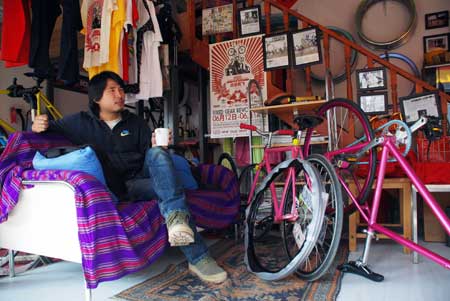While I was in Taiwan 2 weeks ago a writer from the Global Times newspaper came to interview Samantha and random customers that came to my bike shop. Today the article was published on the Global Times website. Here is a copy of their article:
Fixed-gear fixation
Source: Global Times
By Paul Morris
Cycling appears to be devolving. Remember when you were young and needed training wheels to stabilize your first bike? Styles have not gone that far back but they’re not far off. „They’re very cool now. All the hipsters back in Japan have fixed-gear bikes,“ said Chinese fixed-gear enthusiast Liu Lin. „I often ride mine for 100 miles into the hills, but I’m in the minority. Most people hang out in cities trying and look cool.“
The fixed-gear – also referred to as fixed-wheel or single-speed – bike, unlike its geared counterparts, don’t allow the cyclist to freewheel or coast, i.e. you can only move forwards (or backwards) if you are peddling, as the sprocket is attached to the wheel’s hub. Although some still opt for them, this essentially alleviates the need for brakes; if you want to stop, you simply stop peddling.

I met Liu at Beijing (and China’s) only fixed-gear bike shop (which also doubles as juggling store), Natooke, in Wudaoying Hutong. German Ines Brunn opened the shop last year (though the official opening was early March this year). After over five years working for a telecommunications company in Beijing, she wanted to combine her knowledge of business with her true passion. „I had represented the German national team in artistic cycling and have been doing it for over 21 years,“ she said. „It is hard work going through all the paperwork to open a business in China but we finally have our shop.“
After founding a club in 2007, Brunn quickly realized there was a demand not being met amongst Beijing’s cycling community. „People couldn’t get fixed-gear bikes or equipment in Beijing, even though they are made in China, so I saw an opportunity.“
A growth business
Business is slowly taking off. „We’ve sold around 20 bikes since we launched, but we knew it would take time to build interest,“ said Samantha Song, general assistant at Natooke. „It is the same with many things, but as people in China get richer, they spend more on luxuries, like good bikes. And fixed-gear bikes are still a little too expensive for the average Chinese.“
Prices to purchase and assemble a complete bike range from 2,700 to 10,000 yuan, higher than the average standard bike in shops less than a stone’s throw from Natooke, though, as Brunn points out, no more expensive than a good quality road bike. And with the Beijing government’s new bike rental scheme (see page 9), it is difficult to see where fixed-gears will pick-up a market share.
So who is buying them in Beijing? The obvious answer is those who have money; it comes as no surprise that half of Natooke’s clients are foreigners. However, as with many subcultures, fixed-gear cycling is much more than simply riding a bike. „I saved for 6 months to get my first,“ said Kan Jiaming, a math teacher at a local high school. „It’s not simply about the cycling, but all the things that come with it.“
Custom simplicity
Each bike at Natooke is custom-made in the shop, with the customer choosing the parts and the colors; Natooke also converts regular bikes to fixed-gears. The shop is decked with couches and cupboards with peddles, spokes and other cycling paraphernalia. It has the feel of your grandfather’s workshop-cum-coffee shop, and is obviously intended to be a place for the community, rather than the sole purpose of selling things. The parts are imported from Europe predominantly, where fixed-gear bikes are already popular with hipsters and bike messengers, but Natooke also designs and produces its own brand in China: the Flying Banana.
One of the attractions seems to be their simplicity and their reversion from bikes cluttered with gears, brake cables, cogs and reflectors. A fixed-gear bike need not be much more than two wheels, a frame and a chain. When Qing is asked how many people use them in Beijing, she replies „100,“ matter-of-factly. She knows this because there is a club of sorts (with a Facebook site and everything) for Beijing’s fixed-gear bikers who like to get together once or twice a week and ride or practice tricks together. „The community will grow this year,“ said Brunn. „Fixed-gear cycling is getting bigger and once the weather warms, I’d say we’ll have a over 150 members, which represents a big growth.“
The increasingly fashionable bikes are beginning to show signs of straying from the territory of enthusiasts to the realm of the layman, „They’re better for city riding than normal bikes, as you have much more control,“ offered Andrew Cavanagh, the most recent of the 20 who have ever purchased from Natooke. „Beijing is a flat city, so you can move pretty quickly with more confidence about avoiding the city’s cab drivers.“
Cycle theft remains high and „if they want to take it, there is still nothing you can do,“ said Liu. Yet the big challenge will be getting Beijingers to move from seeing cycling as a means of transport to something that can be savored and enjoyed. „Life needs to be about having fun, and that comes once you’ve got enough money to feed your family and you aren’t worrying about rent,“ Liu said. „And there is nothing more fun than cycling.“
There was also another related article published regarding the Beijing government’s efforts to increase the number of cyclists. Read more here.